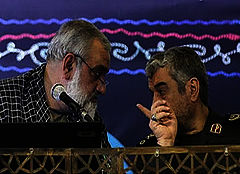The IRGC and the Basij Pursue to Grab a Share in the Benefits
» Since the July Nuclear Deal
Following the nuclear agreement reached between Iran and the six major world powers (the US, Russia, China, Britain, France and Germany) on July 14, 2015 and the endorsement of the deal by the UN Security Council, commanders of Iran’s Revolutionary Guards force (IRGC) changed their confrontational and critical posture towards Hassan Rouhani’s administration and now while laying the groundwork for greater participation in the economic activities of the country once the international sanctions are lifted stress that the roadmap to resolve the economic problems facing the country is by using “the abilities and capacities inside the country” adding there is “no need to help from outside.”
One such voice belongs to IRGC General Mohammad-Reza Naghdi. Speaking during the presentation of the new IRGC military commander for the northern province of Khorasan, Naghdi who heads the Basij ideologue para-military force and is a vice commander of the IRGC proclaimed, “One should not believe that by relying on fake and superficially deceptive powers of foreigners we can solve our problems and have unrealistic expectations that these powers will do anything regarding to resolve our problems.”
Pointing to the recently signed nuclear deal between Iran and the six major world powers, Naghdi claimed, “The need that Western countries have for our resources and markets to boost up their bankrupt economies is so great that even before the signature ink on the nuclear agreement had dried, European companies are pouring into Iran.” He continued, “To solve our problems we must look to our own abilities and potential inside the country. The power of the Iranian nation is not limited to its alert presence in the political realm but in its power to resolve its issues in all areas.”
He set the role of the Basij and said, “The duty of Basij is to advance resistance economy and help the government. Basij is not just a military force. Today, it has the capability of being used for development and construction … provide assistance to industry, culture, economics, domestic production, the reduction of carried-away consumption and stand against cultural invasion of the enemies.”
Over the past few weeks he has been sounding the theme that “inside Iran there are many people who can help in the solution of economic and unemployment problems. Officials must keep the doors of their offices open to them and not to European teams who have until now been sanctioning us and even now are not willing to end the sanctions. They are coming because they have their own economic shortcomings.”
According to him, “If our potentials and the resources of the Iranian nation are properly managed, problems in all areas will be resolved. There is no need for foreign help. The golden key to solving our problems is to rely on our own potentials and the Basij is an example of using this potential.”
The representative of ayatollah Khamenei in the IRGC echoed these words and when speaking to Basij Press website said this about resistance economy which has been promoted by the supreme leader, “There are two views on this. The first stresses the reliance on options outside the country to solve the country’s economic problems which required foreign investment and the nuclear talks served this purpose. The second view is that we have the necessary potential and capabilities inside the country so that with proper management we can solve our problems.” He then said that ayatollah Khamenei preferred the second solution, i.e., reliance on the domestic resources and potentials.
These remarks come after the July 14 deal between Iran and the six major world powers that resolved the long-standing nuclear dispute. When the deal begins to be implemented, sanctions are expected to be lifted, Iranian foreign assets will be freed and foreign companies will be allowed to invest and participate in Iran’s economic development and the rebuilding of its economy, particularly its oil sector that has suffered heavily due to international sanctions.
Naghdi’s message is not new and he had made similar negative remarks about the interest that European countries had demonstrated in coming to Iran after the international sanctions against the country were lifted. He even criticized Rouhani’s administration for meeting representatives of European business enterprises. “Our officials should be thinking of ways to restart the 20,000 half-completed factories. Iran is not an underdeveloped country that would allow its market to be used by foreigners. We must strengthen resistance economy and domestic production,” he had said.


